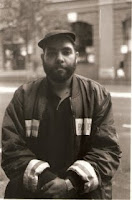Wednesday, August 11, 2010
85701 Research Based Design - Week One
An Exercise in Flanery
The "flaneur" is a concept I'm fairly familiar with, having studied French, a little philosophy, literature and photography. For me, being the flaneur means going out and emersing yourself in the quotidien life - that is, just the everyday normal processes that people go through. Being the flaneur means having so specific destination, no will to change anything about what you see, just to see, listen, smell, touch, observe, chuckle, or cry. Whether it's window shopping, or as the French call it "faire la leche-vitrine" - literally to "do the licking of the shop windows", perambulate through streets following nothing but your curiosity, or go on walkabout to photograph the nuances of the streets, essentially I believe this act is a kind of catharsis for the wanderer. In literature, TS Eliot, Plath, and Joyce wrote what was coined a 'stream of consciousness, and the flaneur does essentially the same thing, on the street instead of pen to a piece of paper.
I think technology bring interesting changes to the practice of the flaneur. It is now technically possible to wander down the streets of any city, sitting in your lounge chair with your laptop and an internet connection. Google street view is a fascinating program in that you can technolocigally walk down any street of your choice, and see what it looked like, what was happening there, what cars were parked there, at the time the photo was taken. A story on my newsfeed on facebook came up a few weeks ago where people had gone and found images of working girls on Google street maps. Although I wasn't too thrilled at this demographic being singled out, I was intrigued by the concept - what else has been frozen in time and made available to everyone? A drug deal? A car driving without licence plates?
To me, the issue of anonymity is crucial for the flaneur. It is important to not have an identity. To not draw attention to oneself. You want to take in what is around you, not change anything by subjecting it to yourself. Cameramen recordning wildlife don't stop the lions from attacking the zebras - if they did, they would disrupt the natural circle of life and never see what happens when lion do attack zebras. In the realm of photography, I think the idea of anonymity comes out a lot in 'flaneur photography". Cartier-Bresson, a photographer famous for hiding himself behind newspapers and using zoom lenses to take his photos stated, “..approach the subject on tiptoe, even if it is a still life”. This idea comes out in many of my favourite photographers - Doisneau. Mary Ellen Mark, and the ones Paul Sutton introduced us to in his presentation. Sander did a photographic project a few years back entitled "Extraordinary images of ordinary people". I think this title captures the essence of what it means to be a flaneur - noticing the extraordinary in what appears to be ordinary. To some extent I used this philosophy when I did some street photography a few years back:
Our 'flanery' from UTS to Darlinghurst brought up many observations for me - the different sounds of the city, graffiti, the histories of certain places, moments in time, being on "autopilot" and not usually noticing these things, the streets being a very solitary place, the different perspectives everyone had on their journey, etc. But I guess the most noticeable thing for me was what makes something or someone noticeable? What makes you slow down and take a look?
This 'situation' we're creating isn't entirely clear to me yet, I guess that's normal. My initial response was an artistic approach - I thought of flash mobs or silent raves or thousands of naked people at the opera house. What keeps being repeated is the idea of 'researching a question', and I'm intrigued as to what this will be. A cultural or social commentary, a political debate, a personal story? I'd like it to be something that addresses that idea of solitary streets or a cold world of strangers. I think walking down the street should be a friendlier experience.
Subscribe to:
Post Comments (Atom)





















No comments:
Post a Comment